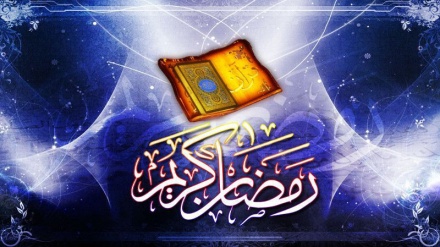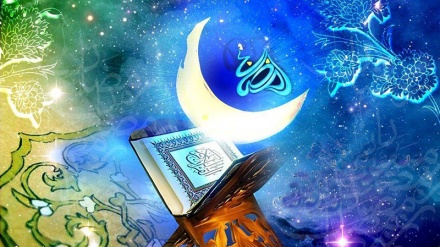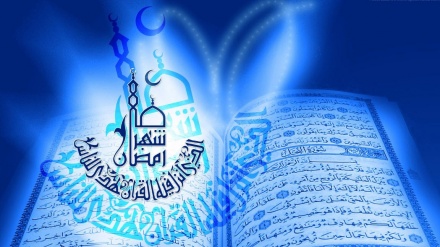Blessed Month of Ramadhan
Welcome to the 9th episode of the series “Blessed Month of Ramadhan”. Today, the Iranian nation is commemorating the 28th passing away anniversary of the Father of the Islamic Revolution, Imam Khomeini (God bless his soul).
It was not in the blessed Ramadhan that he departed from the mortal world, but this year because of the annual difference of some 11 days every year between the lunar and solar hijri calendars, the 14th of Khordad or the 4th of June has fallen on the 9th of Ramadhan. This gives an opportunity to us to refer to some aspects of his life that show his devotion to the obligation of the month of Ramadhan.
During the years of exile in Iraq, the residence of Imam Khomeini in holy Najaf was always under the scrutiny of agents of the repressive Ba’th minority regime of Baghdad. Yet despite facing many difficulties, this man of God used to recite the entire holy Qur’an in blessed Ramadhan every three days.
The Father of Islamic Revolution led a simple life despite leading the grassroots Islamic movement of the people of Iran to rid the country of domestic despotism and American hegemony. In fact, his dynamic personality changed global equations and won the praise of tens of millions of people in other countries around the world. His influential character was the most important factor in the spiritual development of the Iranian nation. The fervent and enthusiastic presence of people on the scenes of the Islamic Revolution, their inclination to revive Islamic values in society, and their marching to the battlefields for safeguarding faith and the country during the Holy Defence era, when the US had imposed the 8-year war in the 1980s through Saddam, took place in the light of the prudent guidelines of the great religious scholar, Gnostic, and campaigner against Global Arrogance, that Imam Khomeini was. He was divinely-inspired figure, who maintained a unique and indomitable resolve in defending the downtrodden and confronting the oppressors. His unique strengths in science, politics, and Gnosis are one of the brightest manifestations of his comprehensive character. He reached an elevated status in science and Gnosis, while concurrently being an influential political and social leader; one of the most astounding facts in history. His peace of mind was a reflection of his solid faith in God and his belief in divine blessings. Imam Khomeini viewed the world as the scene of God Almighty, and said that person really cognizant of the Loving Creator will not commit sin in His Ubiquitous Presence. Whoever studies late Imam’s lifestyle and practical approach soon comes to realize that his life was tied to the blessing of Holy Qur’an. He pointed out: Even if we kneel down throughout our entire life, as a sign of gratitude toward the presence of Holy Qur’an, we still would not be able to be grateful enough.
The first step in establishment of a bond with the Holy Qur’an is to continuously recite the Word of God, otherwise, we may not understand Holy Qur’an’s logic and contents. The proper recitation of the Holy Qur’an with concentration on its timeless wisdom, helps us unravel the dynamics of life and faith. The Late Imam attached significant importance to the recitation f this Holy Book. In an address to his daughter-in-law, late Imam pointed out: Contemplate in Holy Qur’an, which is the source of divine blessings; and prudent recitation of Holy Qur’an guides mankind to a highly elevated status.
One of the children of late Imam notes: His acts of worship in the blessed month of Ramadhan included observance of the late midnight prayers until the break of dawn; and after observance of the obligatory morning prayers, a short period rest in order to get prepared for his daily tasks. He attached paramount importance to this blessed month and made every effort to further benefit from the divine blessings of this sacred month. He made especial developments and changes in his life within this month; while consuming a low amount of food. Even after long days, he ate less in Iftar and Sahar; to an extent that we often thought he hadn’t eaten anything at all.
Ayah 69 of Surat an-Nisa in Holy Qur’an reads:
“Whoever obeys Allah and the Prophet – they are with those who Allah has blessed, including the prophets and the truthful, the martyrs and the righteous, and excellent companions are they!”
Based on this ayah, whoever obeys the instructions of God and the Prophet of God will join those whom Allah has blessed. This ayah in reference to those whom Allah has blessed, points out four groups. The first group consists of the Prophets, who take the first step in the guidance of people and in inviting people to the righteous path. Then second group of the blessed are the Truthful, other than the Prophets, who are sincere and honest in their remarks and actions, clearly showing that they firmly maintain faith in divine instructions. The third group of the blessed are the martyrs who sacrifice their life in the way of God on the basis of their firm and unflinching faith. The fourth group of the blessed are the righteous, who never slip from the right path, attaining a prominent status by carrying out positive and constructive deeds and through compliance with the instructions of the Prophets. Obviously, all four categories of the blessed are excellent companions. The ayahs mean to say that the most excellent companions are persons belonging to this four blessed groups, and companionship with them, benefit us in afterlife as well.
The Iranian gnostic, Khwajah Abdullah Ansari, who flourished a thousand years ago, who has written an exegesis of the Holy Qur’an, says in relation to the revelation of this ayah: “Thoubaan was one of the disciples of Prophet Mohammad (Blessings of God upon him and his progeny). He had become very fragile and weak because of his constant companionship with the Prophet of Islam. One day the Prophet asked him why was he was tolerating such hardships that has caused him to become so weak. In response, he said he was sorrowful because the Prophet of God will be in Heavens in Hereafter, and that he will no longer be able to see him. At this point, this ayah of Holy Qur’an was revealed.”
In the past few days, we spoke of the importance of nutrition in the blessed month of Ramadhan and its impact on mankind’s health. The important point is the type of food we eat. Those who fast, want to earn a Halal and blessed livelihood for their family, because Halal food sets and stage for growth and development of ethical virtues. God Almighty in addition to reminding that He has created countless blessings in the world for the benefit of mankind, invites mankind to consume healthy and Halal food. Holy Qur’an puts emphasis on the relationship between healthy and Halal food and good deeds. In the 51st ayah of Surat al-Momenoun, Holy Qur’an calls on believers to eat healthy and halal food and to make use of the resulting energy in line with good and conducive deeds. God has also pointed out that food consumed with lawful earnings leads to the honour and virtue of mankind. Healthy and Halal food, like truthful and merited remarks, leave an impact on the character and elevation of human spirit, assisting a person to spiritually grow and to maintain ethical values.
Experts opine that consumption of Halal food leads to one’s health, and cheerfulness. A number of beneficial fruits and halal foods have been mentioned in Holy Qur’an, whose importance in human health have been proved. Islamic narrations refer to the impact of these foods on human behaviour. For instance, based on hadiths, honey leads to development of memory, sooths the stomach, and maintains remedial effects. Dates boost one’s patience and tolerance. The Prophet’s 8th Infallible Heir, Imam Reza (AS) recommends consumption of olives, and notes: “Olive oil clears the stomach, reinforces the nerves, and wipes out illnesses; boosts ethics, and grants peace of mind.”
Grapes transform sorrows into happiness. Nutritionists urge those, who fast, to consume such foods on the blessed month of Ramadhan.
MR/AS/ME


